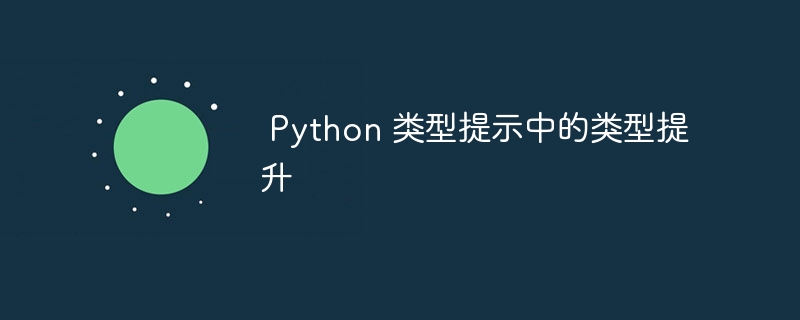Python类型提示升级解析
时间:2025-08-30 23:21:33 287浏览 收藏
想提升Python代码的可读性和可维护性吗?本文聚焦Python类型提示中类型提升的巧妙应用,深入解析如何利用`TypeVar`和`Generic`,更简洁地实现函数根据输入参数类型返回不同类型(如`int`或`float`)的需求。传统方法`@overload`虽然可行,但略显繁琐。本文将通过实例代码,详细介绍使用`TypeVar`和`Generic`的实现方式,助你摆脱冗余代码,让类型提示更加优雅。此外,文章还贴心提示了使用过程中的注意事项,让你在实际应用中少走弯路,写出更健壮的Python代码。立即阅读,掌握Python类型提示的进阶技巧!

但是,这种方法比较繁琐,需要为每种可能的输入类型组合都定义一个重载。
我们可以使用 TypeVar 和 Generic 来实现更简洁的类型提示。首先,我们定义两个 TypeVar,分别表示 a 和 b 的类型:
from typing import TypeVar, Generic
T1 = TypeVar('T1', str, float)
T2 = TypeVar('T2', str, float)然后,我们定义一个 Generic 类 Promoted,它接受两个类型参数 T1 和 T2,并根据这两个类型参数返回相应的类型:
class Promoted(Generic[T1, T2]):
def __class_getitem__(cls, types):
t1, t2 = types
if t1 == str or t2 == str:
return str
return float最后,我们可以使用 Promoted 类来注释 mul 函数的返回类型:
def method(a: T1, b: T2) -> Promoted[T1, T2]:
if isinstance(a, str) or isinstance(b, str):
return f"{a} {b}"
else:
return a*b这样,mul 函数的返回类型将根据输入参数的类型自动推断。
示例代码
以下是一个完整的示例代码:
from typing import TypeVar, Generic
T1 = TypeVar('T1', str, float)
T2 = TypeVar('T2', str, float)
class Promoted(Generic[T1, T2]):
def __class_getitem__(cls, types):
t1, t2 = types
if t1 == str or t2 == str:
return str
return float
def method(a: T1, b: T2) -> Promoted[T1, T2]:
if isinstance(a, str) or isinstance(b, str):
return f"{a} {b}"
else:
return a*b
result1 = method("Hello", "World") # should be inferred as str
result2 = method(3.0, 4.0) # should be inferred as float
result3 = method("Price", 5.0) # should be inferred as str
print(f"{result1=}, {type(result1)=}")
print(f"{result2=}, {type(result2)=}")
print(f"{result3=}, {type(result3)=}")注意: 目前,一些 IDE 可能无法正确推断 Promoted 类的类型。在这种情况下,类型提示可能会显示为 "Promoted" 而不是 str 或 float。但是,这并不影响代码的实际行为。
总结
本文介绍了一种使用 TypeVar 和 Generic 的方法,以在 Python 中实现类型提升的类型提示。这种方法比使用 @overload 更加简洁,并且可以自动推断函数的返回类型。虽然目前一些 IDE 可能无法完全支持这种方法,但它仍然是一种非常有用的技术,可以提高代码的可读性和可维护性。
今天带大家了解了的相关知识,希望对你有所帮助;关于文章的技术知识我们会一点点深入介绍,欢迎大家关注golang学习网公众号,一起学习编程~
-
501 收藏
-
501 收藏
-
501 收藏
-
501 收藏
-
501 收藏
-
342 收藏
-
209 收藏
-
367 收藏
-
434 收藏
-
160 收藏
-
356 收藏
-
154 收藏
-
319 收藏
-
153 收藏
-
354 收藏
-
382 收藏
-
459 收藏
-

- 前端进阶之JavaScript设计模式
- 设计模式是开发人员在软件开发过程中面临一般问题时的解决方案,代表了最佳的实践。本课程的主打内容包括JS常见设计模式以及具体应用场景,打造一站式知识长龙服务,适合有JS基础的同学学习。
- 立即学习 543次学习
-

- GO语言核心编程课程
- 本课程采用真实案例,全面具体可落地,从理论到实践,一步一步将GO核心编程技术、编程思想、底层实现融会贯通,使学习者贴近时代脉搏,做IT互联网时代的弄潮儿。
- 立即学习 516次学习
-

- 简单聊聊mysql8与网络通信
- 如有问题加微信:Le-studyg;在课程中,我们将首先介绍MySQL8的新特性,包括性能优化、安全增强、新数据类型等,帮助学生快速熟悉MySQL8的最新功能。接着,我们将深入解析MySQL的网络通信机制,包括协议、连接管理、数据传输等,让
- 立即学习 500次学习
-

- JavaScript正则表达式基础与实战
- 在任何一门编程语言中,正则表达式,都是一项重要的知识,它提供了高效的字符串匹配与捕获机制,可以极大的简化程序设计。
- 立即学习 487次学习
-

- 从零制作响应式网站—Grid布局
- 本系列教程将展示从零制作一个假想的网络科技公司官网,分为导航,轮播,关于我们,成功案例,服务流程,团队介绍,数据部分,公司动态,底部信息等内容区块。网站整体采用CSSGrid布局,支持响应式,有流畅过渡和展现动画。
- 立即学习 485次学习
